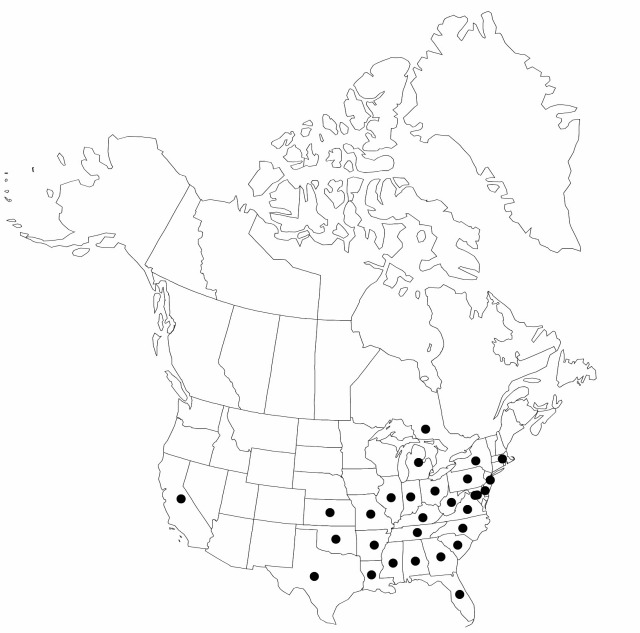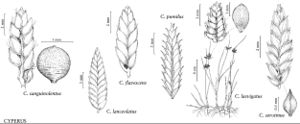Cyperus flavescens
Sp. Pl. 1: 46. 1753.
Herbs, annual, cespitose. Culms trigonous, (2–)4–30 cm × 0.4–2 mm, glabrous. Leaves 1–5, (blades often absent, base of culm with 1 reddish sheath bearing minute blade tooth 1–2 mm), (3–)10–18 cm × (0.5–)1.5–2(–2.6) mm. Inflorescences: spikes 1–3, ovoid or ± digitate, 10–30 × 8–26 mm; rays 1–4(–6), 0.5–3(–9) cm; bracts 2–3, approximately horizontal, 1–12 cm × 0.5–2.5 mm. Spikelets 1–6, compressed, oblong-lanceoloid, 5–15 × (2–)2.3–2.8 mm; floral scales (4–)8–24, closely imbricate, laterally yellow to yellowish brown, margins light brown to clear, medially green, laterally ribless, medially 2–3-ribbed, 2-keeled basally, ovate, (1.5–)1.8–2.2 × 1.8 mm, apex obtuse. Flowers: stamens 3; anthers 0.4 mm, connectives not prolonged; styles 0.5–1 mm; stigmas 0.5–0.8 mm. Achenes jet black to reddish brown, slightly stipitate, obovoid, 1–1.2 × 0.8 mm, apex apiculate, surface with network of rectangular longitudinally elongate cells and transverse undulations.
Phenology: Fruiting summer–early fall.
Habitat: Damp, often disturbed soils
Elevation: 0–800 m
Distribution

Ont., Ala., Ark., Calif., Del., D.C., Fla., Ga., Ill., Ind., Kans., Ky., La., Md., Mass., Mich., Miss., Mo., N.J., N.Y., N.C., Ohio, Okla., Pa., S.C., Tenn., Tex., Va., W.Va., West Indies, South America, Eurasia, Africa.
Discussion
North American populations have been distinguished as Cyperus flavescens var. poiformis; their taxonomic separation was not supported by M. L. Corcoran’s (1941) careful study. Plants of Mexico and Central America consistently have purplish rather than yellowish floral scales and may be recognized as C. flavescens var. piceus (Liebmann) Fernald (G. C. Tucker 1983, 1994).
Selected References
None.
